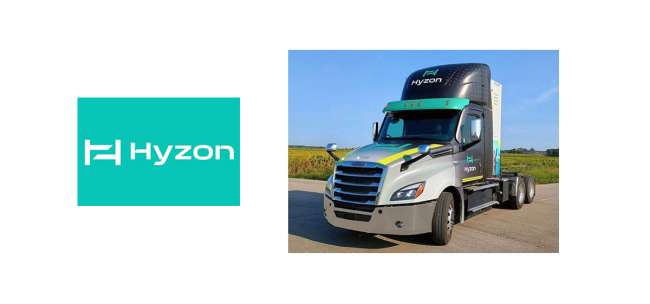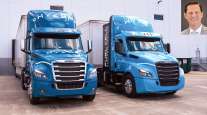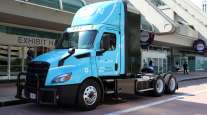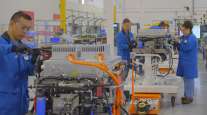Staff Reporter
Hyzon Starts Series Production of Class 8 Hydrogen Fuel Cell Truck

[Stay on top of transportation news: Get TTNews in your inbox.]
Hyzon began series production of its 200-kilowatt Class 8 hydrogen fuel cell electric truck Sept. 16, the Bolingbrook, Ill.-based company said.
Production initially will take place at a Fontaine Modification facility in Charlotte, N.C., Hyzon said.
Hyzon intends to provide Fontaine with kits for the fuel cell system, battery packs and hydrogen storage systems. Fontaine adds these onto vehicle chassis.
The current base chassis for Hyzon’s truck is a Freightliner Cascadia in two day-cab variants, but Hyzon North American operations President Pat Griffin previously told Transport Topics that other options were a possibility for installation of the powertrain.
“Our Class 8 200-kW FCET is the culmination of years of engineering, and today we are proud to announce it has evolved from a prototype to a vehicle ready for full production, empowering fleet operators to reduce emissions without sacrificing power, range or reliability,” said CEO Parker Meeks.
Exciting news! Hyzon has officially started production of our Class 8 200kW Fuel Cell Electric Truck (FCET)! This marks a major milestone in zero-emission transport, empowering fleets to reduce emissions without sacrificing performance.
Read more: https://t.co/aMWW3SBvLs pic.twitter.com/ak3YuIx7ry — Hyzon (@hyzon) September 16, 2024
In the next few weeks, Hyzon expects to begin series production of a single stack 200-kW fuel cell system at its Bolingbrook headquarters.
The 200-kW FCS replaces two 110-kW systems used on first-generation trucks the company built and made available to customers and potential customers for testing, including Performance Food Group. PFG ranks No. 4 on the Transport Topics Top 100 list of the largest private carriers in North America.
Hyzon’s second-generation fueling system is 30% lighter and smaller, and 25% more cost-efficient than its predecessor, the company said.
In its second-quarter earnings, Hyzon said it had launched trials for the second-generation system with two large fleets in July, adding that 25 large fleet trials across both the 110-kW and 200-kW options were planned by the end of January 2025. The carriers are expected to have an average of more than 4,200 trucks per fleet, with 10 of the fleets operating at least 5,000 trucks.
Success! Our first U.S. 200kW pilot Class 8 truck built with production parts rolled off the line at Fontaine Modification’s Charlotte, NC center. On track for 200kW FCEV Start of Production, marking the end of prototypes & reinforcing our third-party assembly strategy. #FCEV pic.twitter.com/F4czcvatuc — Hyzon (@hyzon) September 12, 2024
As production and trials ramp up, Hyzon also is shoring up its finances after a cost-cutting drive and engaging investment house PJT Partners to carry out an operational review, with options including selling all of the company not ruled out.
The cost-cutting involved the shuttering of operations in the Netherlands and Australia, which was announced July 8. Hyzon said waning government support for fuel cell-powered transportation in Europe and Australia contributed to its decision.
Hyzon tipped its hand on the units’ prospects in late June by revealing a strategic realignment to its core North American markets.
TT's Seth Clevenger and Mike Senatore dive into the details behind the 2024 Top 100 Private Carriers list. Tune in above or by going to RoadSigns.ttnews.com.
Also on July 8, Hyzon warned that if sufficient financial backing was not found or another strategic alternative was not secured, then bankruptcy protection through the courts was a possibility.
Hyzon sold 22.5 million shares, raising $4.5 million minus fees, later in July. The sale was the first time Hyzon raised any funds since going public in July 2021.
The company on Sept. 11 took a further step to shore up its finances. A 1-for-50 reverse stock split of the company’s Class A common stock was carried out, which means the shares can continue to be traded on Nasdaq. Retaining a Nasdaq listing makes raising funds easier.
Hyzon posted a $50.8 million loss in Q2, with average monthly net cash burn of $9.2 million. As of June 30, the company’s cash on hand totaled $55.1 million, it said. Starting production, however, will allow the company to increase the revenue side of its balance sheet.
Want more news? Listen to today's daily briefing below or go here for more info:





